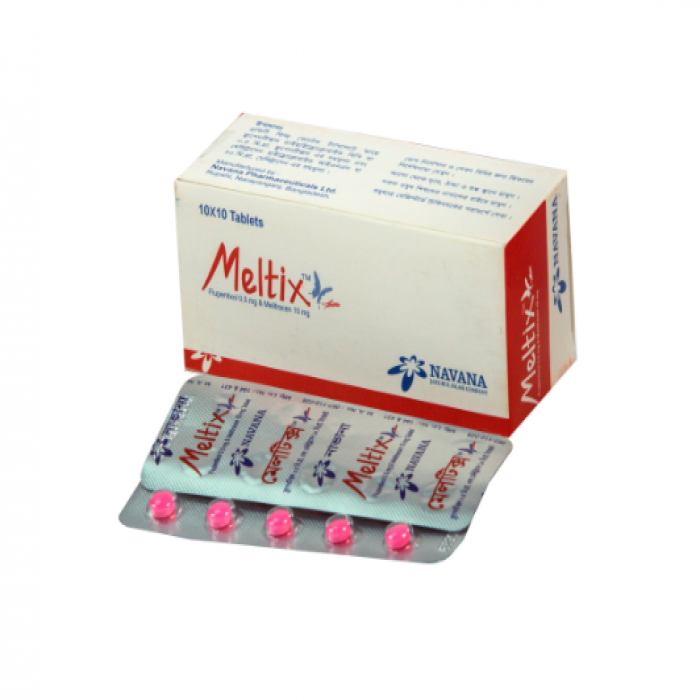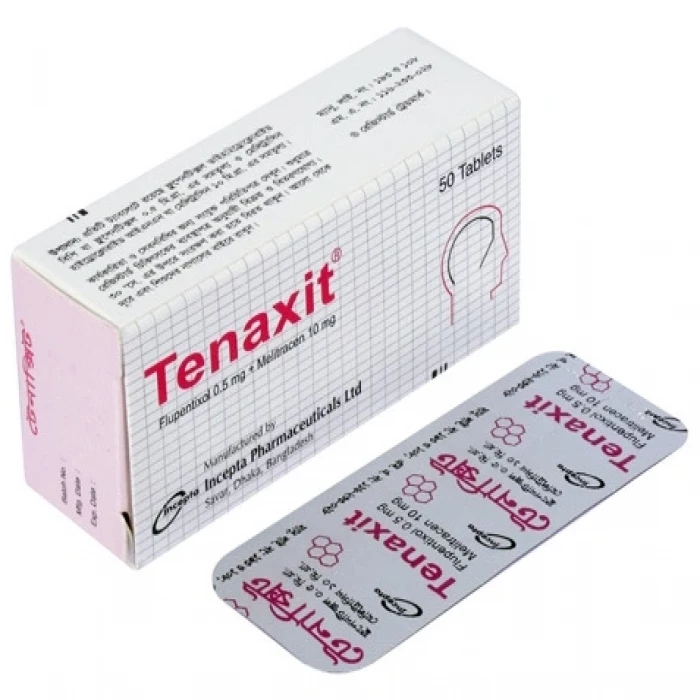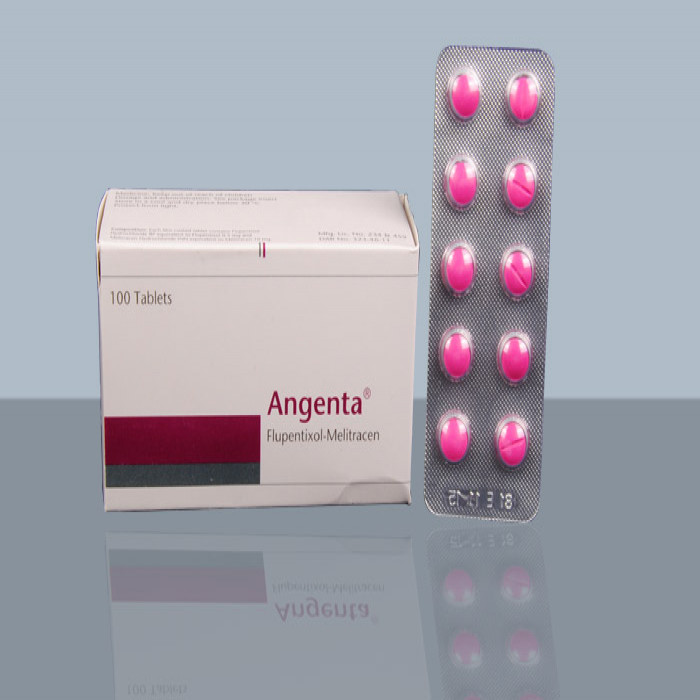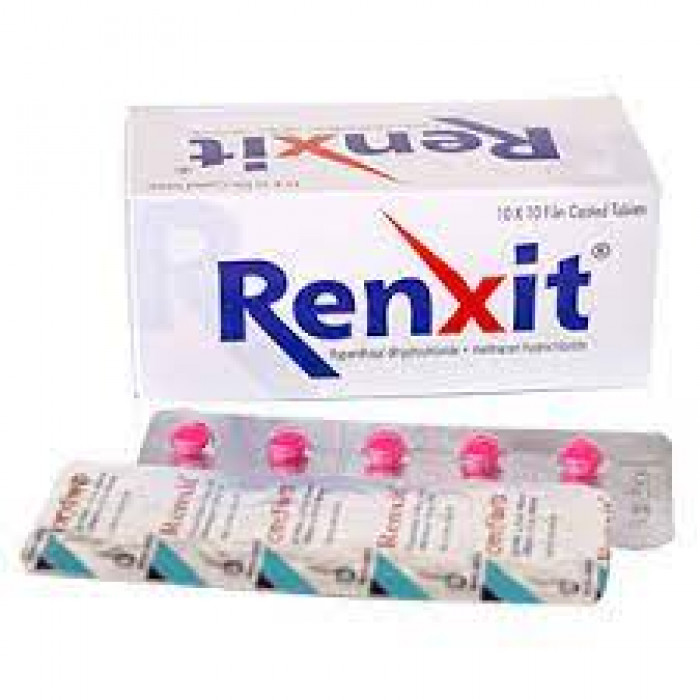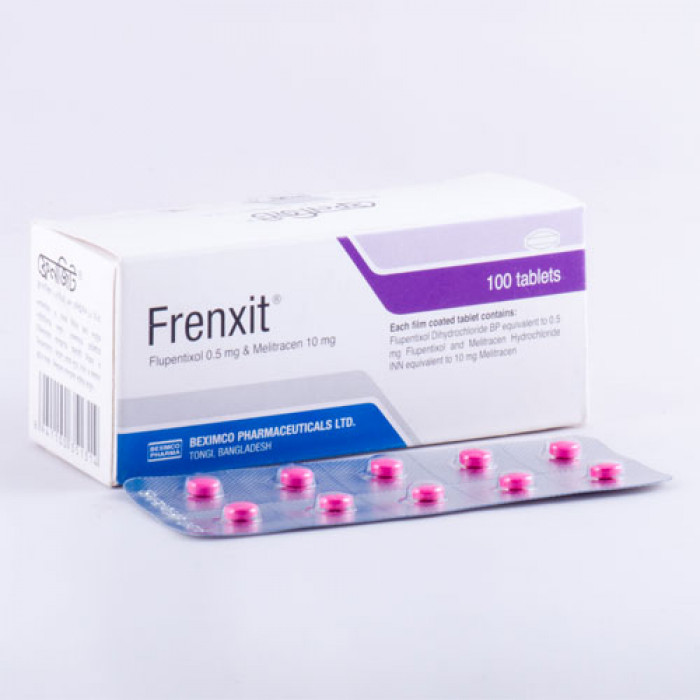

✔ 100% Authentic Product
👁️ Currently Viewing 17601
Frenxit Tablet
- The primary diseases that Frenxit Tablets (Flupentixol 0.50mg + Melitracen 10mg) are used to treat include psychogenic depression, depressive neurosis, asthenia, menopausal depression, depression in alcoholics, and depression in drug users. Feelings of grief, loss, or anger are common symptoms of depression, a mood condition that interferes with a person's everyday activities. The quality of life may be impacted by these symptoms and regular tasks may become difficult.
📄Prescription Required
Discount
Price: ৳ 71
MRP:
৳
75
5%
Off

100% Genuine Products, Guaranteed

Safe & Secure Payments, Always

Fast, Secure & Efficient Delivery

Proper Packaging
 Cash on Delivery - All over Bangladesh
Cash on Delivery - All over Bangladesh Regular Delivery - 12-24 Hours, Dhaka City* Charge Tk.39-59
Regular Delivery - 12-24 Hours, Dhaka City* Charge Tk.39-59 Regular Delivery - 24-48 Hours, Other Cities* Charge Tk.99-110
Regular Delivery - 24-48 Hours, Other Cities* Charge Tk.99-110
🌙 রমযান অফার 🌙
 ফ্রি ডেলিভারিঃ - ৭৯৯ টাকা+ অর্ডারে, ঢাকা
শহরে
ফ্রি ডেলিভারিঃ - ৭৯৯ টাকা+ অর্ডারে, ঢাকা
শহরে ফ্রি ডেলিভারিঃ - ২৭৯৯ টাকা+ অর্ডারে, ঢাকার
বাহিরে
ফ্রি ডেলিভারিঃ - ২৭৯৯ টাকা+ অর্ডারে, ঢাকার
বাহিরে
📲 মোবাইল অ্যাপ অর্ডারে সাশ্রয় বেশী
-
Google Play Store থেকে ডাউনলোড
-
Apple Store থেকে ডাউনলোড
100% Genuine Products, Guaranteed
Safe & Secure Payments, Always
Fast, Secure & Efficient Delivery
Proper Packaging
 Cash on Delivery - All over Bangladesh
Cash on Delivery - All over Bangladesh Regular Delivery - 12-24 Hours, Dhaka City* Charge Tk.39-59
Regular Delivery - 12-24 Hours, Dhaka City* Charge Tk.39-59 Regular Delivery - 24-48 Hours, Other Cities* Charge Tk.99-110
Regular Delivery - 24-48 Hours, Other Cities* Charge Tk.99-110 ফ্রি ডেলিভারিঃ - ৭৯৯ টাকা+ অর্ডারে, ঢাকা
শহরে
ফ্রি ডেলিভারিঃ - ৭৯৯ টাকা+ অর্ডারে, ঢাকা
শহরে ফ্রি ডেলিভারিঃ - ২৭৯৯ টাকা+ অর্ডারে, ঢাকার
বাহিরে
ফ্রি ডেলিভারিঃ - ২৭৯৯ টাকা+ অর্ডারে, ঢাকার
বাহিরে- Google Play Store থেকে ডাউনলোড
- Apple Store থেকে ডাউনলোড
🌙 রমযান অফার 🌙
📲 মোবাইল অ্যাপ অর্ডারে সাশ্রয় বেশী
✅ Description:
- Anxiety refers to a state of being uneasy, fearful, or apprehensive, typically marked by symptoms such as a rapid heart rate, quick breathing, sweating, and fatigue. On the other hand, depression is a condition that affects one's mood and causes prolonged feelings of sadness and disinterest, leading to emotional and physical issues, along with changes in daily activities, appetite, and sleep.
- Flupenthixol and Melitracen, which are included in the medication Frenxit Tablet, are tricyclic antidepressants and antipsychotics. Asthenia, sadness, and anxiety are among the conditions it is used to treat. Neurasthenia, psychogenic depression, disguised depression, menopausal depression, dysphoria, depression in alcoholics and drug addicts, and psychosomatic affections that are accompanied by anxiety and apathy with depressive neuroses are some conditions that it is used to treat.
- Frenxit Tablet is a medication that contains Flupentixol and Melitracen, which are effective in treating various forms of depression and anxiety. Flupentixol works by inhibiting dopamine, a chemical messenger that affects thoughts and mood, while Melitracen raises the levels of chemical messengers in the brain that help regulate mood and treat depression. To ensure optimal treatment, follow the prescribed dosage and duration as determined by your doctor, taking note of potential side effects such as insomnia, restlessness, agitation, dizziness, tremor, dry mouth, constipation, accommodation disorder, and fatigue. Seek immediate medical attention if any of these symptoms persist or worsen. Refrain from using Frenxit Tablet if you are allergic to any of its components, pregnant, planning to become pregnant, or breastfeeding. Avoid consuming alcohol as it may interact with the medication. Frenxit Tablet is not suitable for excitable or overactive patients due to its activating effect, and its safety and efficacy have not been established in children. Keep your doctor informed of your medical condition and any other medications you are taking to ensure that there are no negative effects or interactions.
Safety Advices

Alcohol
UNSAFE
Consumption of alcohol is not recommended while receiving Frenxit Tablet since it may increase the risk of severe adverse effects such as extreme drowsiness, confusion, vomiting, blurred vision, etc

Pregnancy
UNSAFE
Frenxit Tablet is generally not recommended for use by pregnant women unless recommended by your doctor. Consult your doctor before taking it.

Breastfeeding
CONSULT YOUR DOCTOR
Frenxit Tablet is not recommended for use in breastfeeding women unless absolutely necessary. All the risks and benefits should be discussed with the doctor before taking this medicine. If the medicine is used, the infant should be monitored closely for any undesirable side effects.

Driving
UNSAFE
Do not drive or operate any machines if you feel a loss of attention or concentration after taking the Frenxit Tablet.

Kidney
CAUTION
Frenxit tablets should be used with caution in patients having reduced kidney function. Consult your doctor before taking it.

Liver
CAUTION
Frenxit Tablet should be used with caution in patients with liver diseases such as advanced hepatic impairment and reduced liver function. Consult your doctor before taking it.
✔️ Uses of Frenxit Tablet
- Treatment of Depression
✔️ How Frenxit Tablet works?
Frenxit Tablet effectively treats anxiety, depression, and asthenia. Flupenthixol reduces depression and anxiety by blocking the release of dopamine. Melitracen reduces depression by increasing the level of chemical messengers in the brain that result in the regulation of mood and improvement from depression.
✔️ Side Effects of Frenxit Tablet
- Urinary retention
- Weight gain
- Tremor
- Dry Mouth
- Constipation
- Accommodation Disorder (problem with focusing)
- Fatigue
- Sleepiness
- Orthostatic hypotension (sudden lowering of blood pressure on standing)
- Increased heart rate
- The increased prolactin level in the blood
- Blurred vision
- Muscle stiffness
- Tremor
- Restlessness
✔️ Quick Suggestions:
- Frenxit Tablet helps treat anxiety and depression.
- Use caution while driving or doing anything that requires concentration as Frenxit can cause dizziness and sleepiness.
- Avoid drinking alcohol while taking this medicine because it can make drowsiness worse.
- It can cause changes in your blood sugar levels. Monitor your blood sugar regularly.
- Exercise facilitates the body's natural production of antidepressants. In addition, it promotes positive moods, improved self-esteem, and restful sleep.
- Avoid consuming alcohol and smoking.
- Inform your doctor if you have liver disease, thyroid disorder, severe heart disease, or a urinary disorder.
- Talk to your doctor if you notice sudden mood changes or develop suicidal thoughts.
- Let your doctor know you are taking Frenxit before undergoing any surgical procedure.
✔️ Indication of Frenxit Tablet
- Treats anxiety, depression, and asthenia (weakness) and also includes neurasthenia, psychogenic depression, masked depression, menopausal depression, dysphoria, and depression in alcoholics and drug addicts
- Treats psychosomatic affections accompanied by anxiety and apathy with depressive neuroses
✔️ Pharmacology
This is made up of two well-known and well-proven compounds: flupentixol, a neuroleptic with antidepressant and anxiolytic properties in low doses, and melitracen, a bipolar thymoleptic with activating properties in low doses.
✔️ Dosage & Administration of Frenxit Tablet
Adults:
- Take 2 tablets orally twice a day, in the morning and at noon. The morning dose may be increased to two tablets in severe cases.
- 1 tablet in the morning for elderly patients.
Maintenance dose:
- 1 tablet orally first thing in the morning. In the acute phase, additional treatment with a sedative is recommended in cases of insomnia or severe restlessness.
Take Frenxit tablets as prescribed by your doctor. Swallow the tablet as a whole with a glass of water. Do not crush, break or chew the tablet.
✔️ Interaction
Frenxit Tablet has the potential to interact with certain medications, including MAO inhibitors (such as isocarboxazid and phenelzine), barbiturates (like pentobarbital and phenobarbital), CNS depressants (including diazepam, clonazepam, and alprazolam), and neuroleptics (like thioridazine and chlorpromazine).
Additionally, Frenxit Tablet should not be used by patients with circulatory collapse (specific failure of blood circulation), a depressed level of consciousness, untreated narrow-angle glaucoma, coma, blood disorders, phaeochromocytoma (a small vascular tumor), recent myocardial infarction (heart attack), any degree of atrioventricular block or disorders of cardiac rhythm, and coronary artery insufficiency.
✔️ Contraindications
Frenxit Tablet should not be used by individuals who have circulatory collapse, a depressed level of consciousness due to any cause, blood disorders, coma, phaeochromocytoma (a type of neuroendocrine tumor), hereditary issues related to galactose intolerance, total lactase deficiency or glucose-galactose malabsorption, excitability, overactivity, or mania, and dementia-related behavioral disturbances.
Before taking Frenxit Tablet, individuals should inform their doctor if they have convulsions, organic brain syndrome, urinary retention, signs of hyperthyroidism such as unintentional weight loss and rapid and irregular heartbeat, a history of suicide-related events, diabetes, or planned surgeries.
✔️ Pregnancy & Lactation
Frenxit tablets should not be taken while pregnant or breastfeeding.
✔️ Precautions & Warnings
- Frenxit tablets should not be used by individuals who are allergic to any of its components.
- Pregnant, planning to become pregnant, or breastfeeding women should consult their doctor before using the medication.
- Individuals who have circulatory collapse, depressed level of consciousness due to any cause, untreated narrow-angle glaucoma, coma, blood disorders, phaeochromocytoma, recent myocardial infarction, any degree of atrioventricular block, or disorders of cardiac rhythm and coronary artery insufficiency should inform their doctor before using the medication.
- Taking Frenxit tablets with monoamine oxidase inhibitors (MAOIs) is not recommended, as it may cause serotonin syndrome, which is characterized by symptoms such as confusion, agitation, tremors, hyperthermia, and myoclonus.
- Frenxit tablets are not recommended for use in children and adolescents below 18 years of age.
- Frenxit tablets should be used with caution in elderly patients (aged above 75 years of age).
- Therefore, individuals should not use Frenxit tablets if they are taking MAOIs or have taken them within the past 14 days
✔️ Storage Conditions
Store in a cool and dry place away from sunlight. Keep out of children's reach.
⚠️Disclaimer:
At ePharma, we’re committed to providing accurate and accessible health information. However, all content is intended for informational purposes only and should not replace medical advice from a qualified physician. Please consult your healthcare provider for personalized guidance. We aim to support, not substitute, the doctor-patient relationship.




